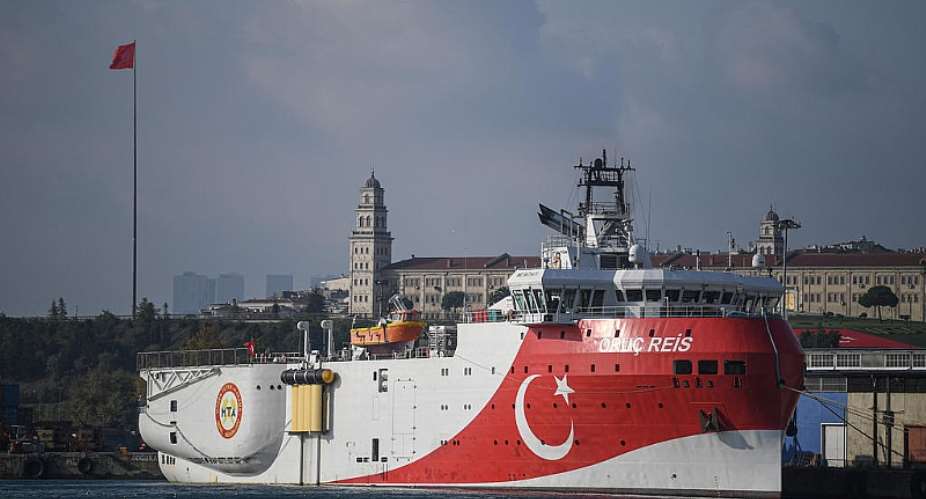Turkish authorities have said that the Oruc Reis exploration vessel will carry out seismic surveys in a disputed part of the eastern Mediterranean until 27 August, in a move likely to increase already simmering tensions in the region.
Turkey and Greece, both Nato members, disagree sharply over rights to hydrocarbon resources in the eastern Mediterranean. Ankara and Athens can't see eye to eye over the extent of their continental shelves in waters dotted with islands, most of them Greek.
Earlier this month, Turkey said the Oruc Reis would conduct seismic exploration until 23 August in waters claimed by Greece, Cyprus and Turkey. Athens has called the survey “illegal”.
In reaction, French President Emmanuel Macron ordered the deployment of two Rafale fighter jets and two navy vessels to the eastern Mediterranean to provide support for Greek naval patrols.
The ships and jets arrived in Crete and carried out joint manoeuvres with Greek forces, acording to defence sources in Athens.
Navigational telex
On Sunday, the Turkish navy issued a “navigational telex” (“navtex”) saying that the work of the Oruc Reis and two other vessels, the offshore supply ship Ataman and the tug supply vessel Cengiz Han, would continue until 27 August.
Currently the three ships are operating about 200 km south of Turkey, in a stretch of Mediterranean between Cyprus and the Greek island of Crete.
Seismic surveys are part of preparatory work for potential hydrocarbon exploration. Turkey and Greece are also at odds over issues such as flight paths over the Aegean Sea and the ethnically divided island of Cyprus, where the Turkish Republic of Northern Cyprus is controlled by Ankara, while the Republic of Cyprus is a full-fledged member of the European Union.
Black sea gas find
Last Friday, President Tayyip Erdogan announced the discovery of a 320 billion cubic meter gas field in the Black Sea, the largest such find in Turkish history.
Ankara hopes to start exploiting the gas by 2023, when Turkey will mark the centenary of the founding of the republic, Erdogan said.
“Turkey has realised the greatest natural gas discovery in its history,” he said. “We are determined to solve our energy issue. We will not stop until we become a net exporter of energy.”
Berat Albayrak, the economy minister and Erdogan's son-in-law, said the government hopes profits from the sale of gas will wipe out Turkey's current account deficit.
But while the find is significant, it is smaller than other discoveries in the nearby eastern Mediterranean. The Black Sea discovery is about a third of Egypt's Zohr field, one of the largest ever found in the Mediterranean, which is estimated to hold 850 billion cubic meters, nearly three times the Turkish find.





 Saglemi Housing Project will not be left to rot – Kojo Oppong Nkrumah
Saglemi Housing Project will not be left to rot – Kojo Oppong Nkrumah
 Transport fares hike: GPRTU issue two-day ultimatum
Transport fares hike: GPRTU issue two-day ultimatum
 ARC endorses Alan as presidential candidate – Buaben Asamoa
ARC endorses Alan as presidential candidate – Buaben Asamoa
 Akufo-Addo appoints Kwasi Agyei as new Controller and Accountant-General
Akufo-Addo appoints Kwasi Agyei as new Controller and Accountant-General
 PNC dismiss reports of mass resignations
PNC dismiss reports of mass resignations
 PAC advocates for revenue collectors to be engaged on commission basis, not full...
PAC advocates for revenue collectors to be engaged on commission basis, not full...
 Genser Energy commissions 110km of natural gas pipeline at Anwomaso
Genser Energy commissions 110km of natural gas pipeline at Anwomaso
 Naa Torshie calls for tolerance, peace ahead of 2024 election
Naa Torshie calls for tolerance, peace ahead of 2024 election
 Asantehene commends Matthew Opoku Prempeh for conceiving GENSER Kumasi Pipeline ...
Asantehene commends Matthew Opoku Prempeh for conceiving GENSER Kumasi Pipeline ...
 Let’s do away with ‘slash and burn politics’ in Ghana — Dr Adutwum
Let’s do away with ‘slash and burn politics’ in Ghana — Dr Adutwum
